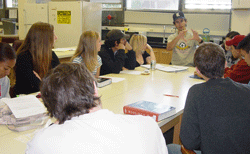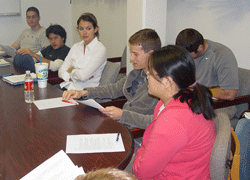![]()
| Preparing
Bioscience Undergraduates to Write and Speak Biology |
|||
experiences for students,
as reflected by this student comment on an evaluation of the writing
assignments: “My thoughts have become more organized, which
is extremely important in scientific writing. Also, the assignment
to explain the article to a layperson prepares pre-med students for
the work they will do with patients.”
Doing It All - Writing, Presenting, and Discussing
in 201: 2005–2007 The groups are student-led, with one student responsible for presenting a short explanation of the topic, while another mediates the discussion as a discussion leader. A trained group leader (who has taken BIOS 201 in the past) observes the process, keeps each group on track by correcting any inaccuracies, and assesses individual participation and group performance. The group leaders are not mini-instructors, however—they let each group work through its own process.
Today BIOS 201 discussion groups learn how to research a topic, present information to teammates, and work through problems in a collaborative environment. BIOS 202 students continue to delve into the scientific literature, reading and summarizing original research. Their experiences in the 201 discussion groups prepare them for independent response to articles. As a result of this year-long communication-intensive course, bioscience majors will be better prepared to solve research problems, work as part of a laboratory team, and contribute to publications and presentations. Introductory Biology is preparing Rice bioscience majors for their bioscience careers at Rice and beyond.
|
|||
“Most students seem to enjoy the discussion process and have reported that it helps them keep up with the material...”
|
| Cain Project Home>>Newsletters |
January 2007X
|

